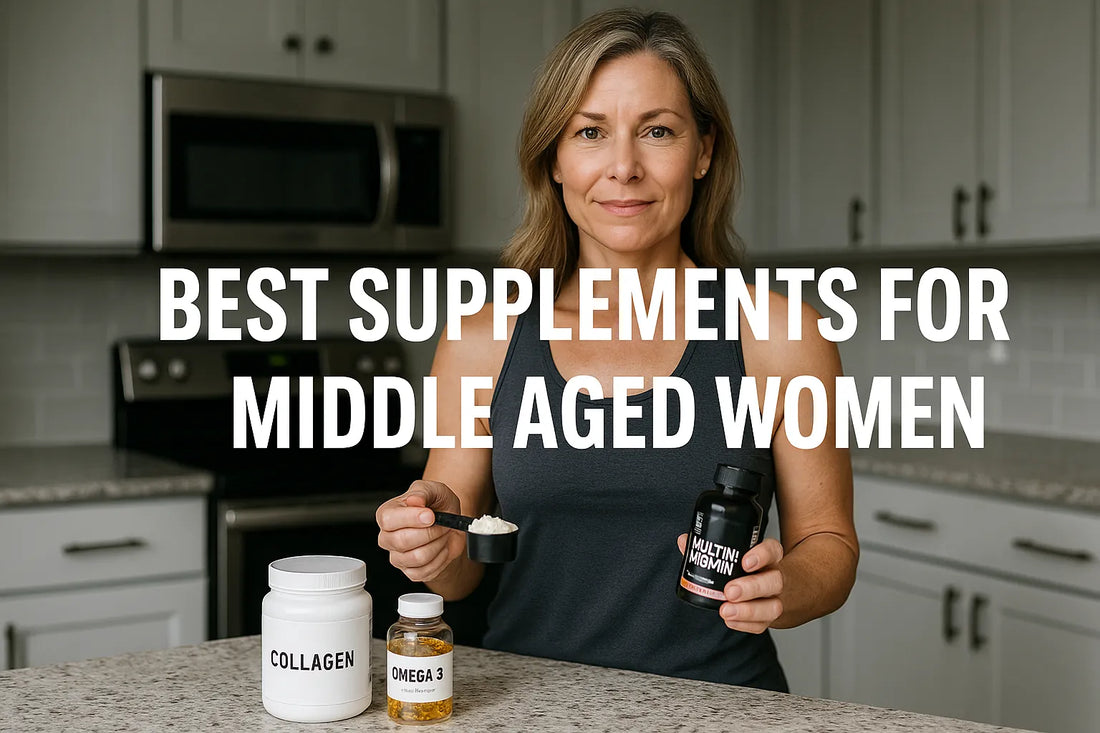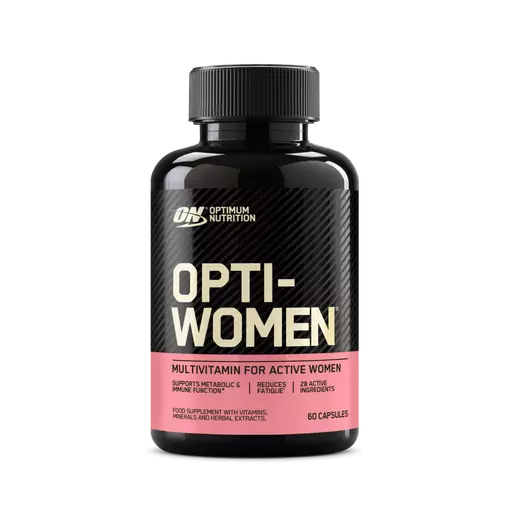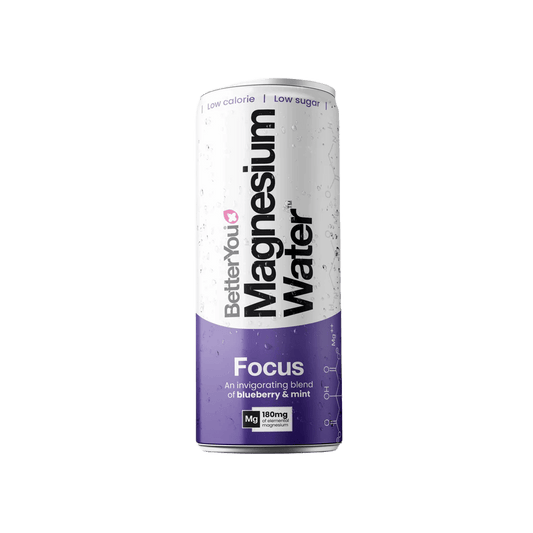Introduction: Stronger, Smarter, and Still Evolving
Middle age isn’t a slowdown — it’s a shift. A hormonal pivot. A new set of challenges, and a new level of potential.
In your 40s and 50s, your body begins to write a different story. Menopause, perimenopause, slower recovery, changes in skin, muscle tone, mood, and energy. But none of it means decline — it just means you need a different toolkit.
This is where smart supplementation can step in and make a real impact.
In this guide, we cut through the wellness noise and build a supplement strategy for women over 40 that’s rooted in physiology, science, and results — not trends.
1. Can I Take 50+ Vitamins If I’m Not 50?
The short answer? You could. But you might be missing the mark.
“50+” formulas are usually designed for post-menopausal women — they often reduce iron (because monthly blood loss is no longer a factor) and increase things like B12 and calcium. If you're perimenopausal, still menstruating, or navigating fluctuating cycles, those formulas may underserve you.
Instead, choose a multivitamin formulated with the specific needs of active women 40+: hormonal shifts, bone density, immune resilience, and skin support.
✅ Enter: Optimum Nutrition Opti-Women — 23 vitamins and essential minerals, with added botanical extracts, iron (for menstruating women), and B-complex for energy and mood.
It’s designed for real-world demands, not outdated demographic boxes.
2. Do Multivitamins Really Work?
Here’s the deal: multivitamins won’t undo poor diet, bad sleep, or skipping strength training. But they will cover the cracks — the small deficiencies that chip away at your energy, immunity, focus, and hormone balance.
As we age, nutrient absorption gets spottier — especially for B12, magnesium, and iron. Stress, long working hours, and inconsistent eating patterns only make things worse.
A quality multivitamin acts like a nutritional seatbelt: you might not need it every moment, but you’ll be glad it’s there when life hits hard.
🔍 Look for:
-
Methylated B12 (methylcobalamin)
-
Active B6 (pyridoxal-5-phosphate)
-
Zinc, magnesium, selenium
-
Iron (if still menstruating)
-
No artificial fillers or underdosed nonsense
Optimum Nutrition Opti-Women hits these marks without trying to be trendy. Just solid nutrition with an eye on what women actually need.

3. What Does Magnesium Do for the Body?
Magnesium is a powerhouse — and women over 40 are often chronically low in it.
Why it matters:
-
Supports restful, deep sleep
-
Regulates mood and stress (via cortisol control)
-
Supports healthy bones and joints
-
Helps regulate perimenopausal symptoms like hot flashes, anxiety, and fatigue
-
Supports muscle recovery and prevents cramps
If you’re tossing and turning at night, feeling achy after training, or more anxious than usual — magnesium might be your missing link.
✅ Choose forms like magnesium glycinate or citrate (more absorbable, gentler on digestion). You’ll find it in many well-formulated multivitamins, or take it solo in the evening as a wind-down aid.
Uncle Gym stocks several blends that include magnesium in bioavailable forms — ask us if you’re not sure what works best with your routine.
4. What Are Signs of Vitamin Deficiency in Women?
As estrogen begins to decline in your 40s and 50s, your body can become more sensitive to even mild nutritional gaps.
Here are some red flags to watch for:
|
Symptom |
Possible Deficiency |
|
Constant fatigue |
B12, iron, magnesium |
|
Brittle nails or hair loss |
Biotin, zinc |
|
Mood swings / anxiety |
B6, magnesium |
|
Weak immunity |
Vitamin D, C, selenium |
|
Poor recovery from workouts |
Protein, magnesium, electrolytes |
|
Hot flashes or poor sleep |
Magnesium, vitamin E, adaptogens |
📌 A multivitamin won’t fix everything, but it helps buffer the inconsistencies — especially during hormonal shifts.
Add in omega-3, magnesium, and protein, and you’ve got a foundational stack that’s far more powerful than any single miracle pill.
5. What Is the Best Supplement for Women Over 50?
Let’s define “best.”
The best supplement is one that:
-
Supports hormone regulation without risky side effects
-
Promotes strong bones and joints
-
Boosts energy without overstimulation
-
Helps preserve lean muscle and reduce inflammation
-
Supports mental clarity and emotional balance
While that’s a lot to ask from one product, Optimum Nutrition Opti-Women comes close. But for post-menopausal women, adding omega-3, collagen, and creatine (yes, creatine) completes the stack.
✅ Supplement Needs Omega 3 — a premium omega-3 formula for heart, joint, skin, and brain health.
✅ Reflex Clear Whey Isolate — light, refreshing protein to support lean tissue without bloating.
✅ Creatine Monohydrate (Naughty Boy Prime) — supports strength, cognition, and recovery (especially helpful post-menopause when natural creatine levels drop).
This stack supports women through physical and hormonal change with calm, consistent results — no gimmicks.
Now We're Ready For Part 2!
Coming up:
- Menopause
- Collagen
- Hormone Balance
- What Not To Take
- Daily Essentials
- FAQ’s
Best Supplements For Middle Aged Women (Part 2)

6. What Supplements Should a 50‑Year‑Old Woman Take?
50 is not the beginning of the end — it’s the beginning of a new chapter. But it’s one that needs support.
This is the decade where hormonal shifts settle, but risks rise: bone density drops, joint pain creeps in, and recovery slows. But with the right nutrients, you can build resilience from the inside out.
Essential Stack for Women 50+:
-
Multivitamin – nutrient security + energy
-
Omega-3 – brain, joints, skin, inflammation
-
Creatine – muscle, cognition, metabolism
-
Magnesium – sleep, mood, stress
-
Collagen – skin elasticity, bone support
-
Protein – tissue repair + muscle preservation
💡 A complete supplement stack at this age doesn’t overpromise — it simply ensures that your body can continue showing up.
✅ Featured product: Optimum Nutrition Opti-Women
Backed by essential vitamins, iron, botanicals, and support for energy metabolism.
Add in Supplement Needs Omega 3, Reflex Clear Whey Isolate, and Naughty Boy Prime Creatine, and you’ve got a real-world, powerful supplement foundation — nothing wasted.

7. What Is the Best Vitamin for Menopause?
Menopause isn’t just a lack of periods. It’s a physiological and psychological recalibration. Estrogen levels drop. Hot flashes, brain fog, mood swings, sleep disruption — all on the table.
There’s no one magic vitamin — but several nutrients shine:
-
Vitamin E – may reduce hot flashes and oxidative stress
-
Vitamin D3 – bone protection and hormone regulation
-
Magnesium – calms the nervous system
-
B6 & B12 – mood and energy support
-
Omega-3s – combats inflammation and cognitive dip
And don’t sleep on adaptogens like Ashwagandha, these can be great for managing stress, hormones and supporting fertility.
A good multivitamin like Opti-Women hits most of these notes. Add magnesium and omega-3, and you’ve got a minimalist menopause stack.
8. What Supplements Not to Take After 50?
More isn’t always better — especially after 50. Some supplements either lose relevance or start working against you.
❌ What to be cautious with:
-
High-dose iron – unless blood-tested and advised by a doctor
-
Stimulant-heavy fat burners – adrenal stress, heart risk, disrupted sleep
-
Excess vitamin A – can impact bone density in older women
-
Non-bioavailable multivitamins – poorly absorbed forms just waste time
Stick to clean, bioavailable supplements that prioritise long-term health over short-term hype.
✅ All Uncle Gym products are handpicked to avoid these pitfalls.
9. What Is the Most Important Supplement to Take Daily?
Trick question — there’s no one-size-fits-all. But if we had to choose one? A solid multivitamin with high-quality forms of essential nutrients.
Why? Because it:
-
Covers gaps from inconsistent eating
-
Supports hormonal health
-
Improves immunity and skin
-
Helps regulate energy and stress
✅ Optimum Nutrition Opti-Women wins again — not flashy, just effective.
If you can add two more? Go with omega-3 (for skin, heart, and joints) and magnesium (for sleep and mood).
That trio alone is transformative for many women over 40.
10. Should Older Women Take Supplements?
Absolutely — if they want to maintain:
-
Bone density
-
Cognitive sharpness
-
Hormonal balance
-
Muscle strength
-
Mood and sleep quality
-
Energy and recovery
Ageing well isn’t about fighting nature — it’s about fueling it properly.
Supplements aren’t a crutch. They’re a toolkit — especially for active, health-conscious women who refuse to fade out.
🧠 FAQ: Supplements for Women Over 40
Should women over 40 take creatine?
Yes — it supports muscle, strength, and even brain function, especially post-menopause.
Do women need different supplements after menopause?
Yes — lower estrogen changes nutrient needs (calcium, D, magnesium, collagen, omega-3).
What’s the best supplement stack for active women in their 40s?
Multivitamin, creatine, omega-3, magnesium, protein, collagen.
What helps with fatigue in middle aged women?
B12, iron (if low), magnesium, adaptogens, protein, sleep hygiene.
What vitamins support energy and recovery for women over 45?
B-complex, magnesium, vitamin D, creatine, and amino acids.





